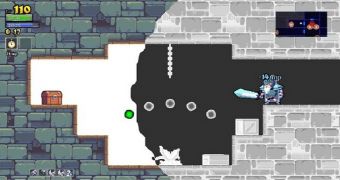Independent developer Cellar Door Games has made some very interesting reveals during their talk at the Game Developers Conference in San Francisco, focusing on developing games on a tight budget.
Their famous creation, Rogue Legacy, was met with acclaim from both players and critics and saw great financial success as far as indie titles go, moving 100k copies in its first week of life, with Cellar Door Games stating that it was "well beyond anything we had ever anticipated."
Cellar Door Games described itself as a budget-oriented team that focuses on gameplay over expensive and highly detailed worlds, as Destructoid reports.
"That means we're always on the lookout for solutions that are cheap, fast, and reusable. So we often implement solutions that aren't as good if the cost savings are justified. That also means we'll never make the perfect game, but we're okay with that," Cellar Door Games' Kenny Lee stated.
The studio had made eight games before starting work on Rogue Legacy, with an average cost of $1000 / €720 per title and development schedules that ranged from two days to three and a half months.
The experience gained from making their first games allowed them to tackle a more ambitious task, in the form of a year and a half project that saw the appearance of the casual roguelike game Rogue Legacy, developed from scratch by the team.
The project was fully funded from their own pocket and the tally reached $15k / €11k over the course of those 18 months, which is a great deal more than their previous games but still conservative when considering the scope of the game.
Throughout the course of development, the team constantly cut features that felt too ambitious and salvaged the parts that could be used elsewhere. They worked with other autonomous individuals and created a custom editor for the game, always going for "cheap, fast, reusable solutions" instead of crafting them by hand, such as the system used for procedurally generating levels.
They offered an example of their "zero dollar solution" mantra, citing Rogue Legacy's lineage system, which was initially conceived as a complex tree of characters, but was later stripped down to its bare bones and implemented in its simplistic existing form, with players picking the next heir out of a list.
"Finding simple solutions to big problems is the most entertaining part of development," Lee concluded.
The good thing for the indie devs was that the entirety of the development costs was recuperated in less than an hour since the game had been available to buy, and then went on to sell over 100k units in the first week alone.

 14 DAY TRIAL //
14 DAY TRIAL //